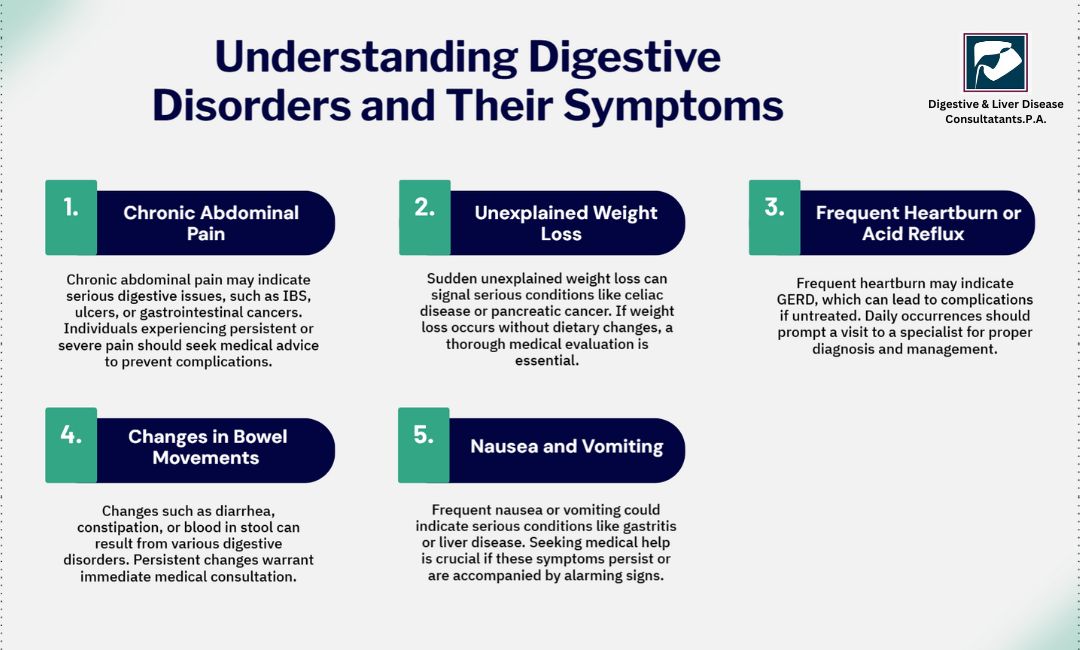Digestive health is essential to overall well-being. Your digestive system plays a crucial role in breaking down food, absorbing nutrients, and eliminating waste. When something goes wrong with this system, it can cause discomfort and affect your entire body. Many digestive issues are mild and go away on their own, but some can signal more serious health problems that require medical attention.
In this blog, we will highlight some common digestive disorder symptoms that you shouldn’t ignore, offering insights into when to seek help and why it’s important to take action early.
1. Chronic Abdominal Pain or Discomfort
Abdominal pain is one of the most common digestive symptoms, but when it becomes chronic, it could point to underlying digestive issues. Mild stomach cramps or bloating after eating certain foods may be normal, but if you experience persistent or severe pain, it could indicate conditions like irritable bowel syndrome (IBS), ulcers, or even gastrointestinal cancers.
If your abdominal pain is sharp, consistent, or gets worse over time, don’t hesitate to seek professional medical advice. Early diagnosis can help prevent more serious complications.
2. Unexplained Weight Loss
Sudden, unexplained weight loss can be a red flag for several digestive disorders, including conditions like celiac disease, Crohn’s disease, or even pancreatic cancer. When your digestive system isn't absorbing nutrients properly, it can lead to unintentional weight loss. This may also be a sign of a more serious liver condition.
If you notice significant weight loss without changes in your diet or exercise routine, it's important to see a doctor for a thorough evaluation.
3. Frequent Heartburn or Acid Reflux
Occasional heartburn or acid reflux might not be a big concern, but when it happens frequently, it could signal gastroesophageal reflux disease (GERD). GERD occurs when stomach acid backs up into the esophagus, causing discomfort, burning sensations, and even damage to the esophageal lining. Untreated GERD can lead to complications such as esophageal ulcers or even cancer.
If heartburn becomes a daily occurrence or interferes with your daily activities, it’s time to visit a specialist for proper diagnosis and treatment.

4. Changes in Bowel Movements
Changes in your bowel movements—whether diarrhea, constipation, or alternating between the two—could point to several digestive disorders. Conditions like IBS, inflammatory bowel disease (IBD), and infections can all affect bowel function. Any sudden and lasting changes in stool consistency, frequency, or the presence of blood should be addressed with your healthcare provider.
If you notice blood in your stool or if diarrhea or constipation persists for weeks, don’t wait—seek medical attention immediately.
5. Excessive Gas and Bloating
While occasional bloating and gas are normal, frequent or severe bloating can be a sign of an underlying issue. Excessive gas or persistent bloating may indicate food intolerances, such as lactose intolerance, or more serious conditions like IBS or digestive infections.
If bloating is accompanied by nausea, vomiting, or pain, it’s essential to consult with a doctor to identify the cause and find an appropriate treatment plan.
6. Nausea and Vomiting
Nausea or vomiting is not uncommon, especially after eating something that doesn't agree with you. However, frequent or severe nausea and vomiting are signs of something more serious. Conditions like gastritis, ulcers, or liver disease can cause these symptoms. Additionally, persistent nausea may be a sign of a gastrointestinal infection or even food poisoning.
If nausea and vomiting persist for more than a couple of days, or if you notice other alarming symptoms such as fever, dehydration, or blood in your vomit, it’s time to see a doctor immediately.
7. Fatigue or Weakness
Unexplained fatigue can sometimes be linked to digestive issues, especially if your body isn’t absorbing nutrients effectively. Conditions like celiac disease, Crohn’s disease, or liver disease can impair nutrient absorption, leading to deficiencies that cause tiredness, weakness, and even anemia.
If your digestive system is not functioning properly, your body might not get the energy it needs to function optimally. If you’re feeling excessively tired despite rest, you should talk to a healthcare professional.
8. Jaundice (Yellowing of Skin and Eyes)
Jaundice is a sign that something is wrong with the liver or bile ducts. If the liver is not functioning properly, excess bilirubin can build up in the blood, leading to yellowing of the skin or the whites of the eyes. Jaundice can occur with conditions like hepatitis, cirrhosis, or liver cancer.
If you notice any yellowing in your skin or eyes, it’s crucial to seek medical attention right away. Early intervention can make a significant difference in outcomes.
9. Swallowing Difficulties
Difficulty swallowing or feeling like food gets stuck in your throat or chest could indicate issues like acid reflux, esophageal narrowing, or even cancer. If you find yourself constantly struggling to swallow, or if you experience pain while swallowing, it’s essential to seek an evaluation from a healthcare provider.
10. Dark or Bloody Stool
Seeing blood in your stool or noticing that your stool is dark in color can be alarming. This may be a sign of internal bleeding in the digestive tract, such as from ulcers, hemorrhoids, or more severe conditions like colorectal cancer.
If you notice these symptoms, it’s important to consult with a healthcare provider as soon as possible to determine the cause and get the necessary treatment.
At Digestive & Liver Disease Consultants, P.A., we specialize in diagnosing and treating a wide range of digestive and liver disorders. Our experienced specialists are committed to providing personalized care tailored to each patient's needs. Whether you're dealing with chronic acid reflux, unexplained weight loss, or any other digestive concerns, our experts are here to guide you toward a solution.
Conclusion: Protect Your Digestive Health
Digestive disorders can significantly impact your quality of life, but with early detection and proper treatment, most conditions can be managed effectively. Don’t ignore the signs your body is sending.
If you’re experiencing any of the symptoms discussed in this blog, don’t wait—schedule an appointment with our best gastroenterologists.






